

Letters of James Agee to Father Flye
by James Agee
- Used
- Hardcover
- first
- Condition
- Very Good+/Very Good+
- Seller
-
Rochester, New York, United States
Payment Methods Accepted
About This Item
Synopsis
James Agee (1909–1955) was born in Knoxville, Tennessee. He graduated from Harvard in 1932 and was hired as a staff writer at Henry Luce’s Fortune magazine. His collection of poetry, Permit Me Voyage , won the Yale Series of Younger Poets competition and was published in 1934. Though he hoped to dedicate himself full-time to poetry and fiction, Agee would remain a Time, Inc., writer for fourteen years, winning high praise from Luce himself, who considered Agee’s Fortune essay on the Tennessee Valley Authority to be the best the magazine ever published. (For his part, Agee fantasized about shooting Luce.) His book about Alabama tenant farmers during the Depression, Let Us Now Praise Famous Men , a collaboration with the photographer Walker Evans, appeared in 1941. The book was a commercial and critical failure, selling just six hundred copies in its first year of publication. Agee was later renowned for his film criticism, which appeared regularly in The Nation and Time . He cowrote the screenplays for The African Queen and The Night of the Hunter , as well as a screenplay for Charlie Chaplin, though it was never produced. Agee died of a heart attack in a New York City taxicab at forty-five. Two years later, his novel, A Death in the Family , was published and won the Pulitzer Prize. Let Us Now Praise Famous Men was republished in 1960 and hailed, on its rerelease, as an American classic. In 2013, Cotton Tenants: Three Families , a rediscovered magazine article about the Alabama tenant families, was published to critical acclaim. James Harold Flye (1884–1985) was an Episcopal priest and teacher. He spent thirty-six years at St. Andrew’s school in Tennessee, and later served as a pastor at St. Luke’s in New York. Robert Phelps (1922–1989) was an editor, author, and translator. He was a cofounder of Grove Press and edited works by Colette and Jean Cocteau.
Reviews
(Log in or Create an Account first!)
Details
- Bookseller
- Genesee Books
(US)
- Bookseller's Inventory #
- 100341
- Title
- Letters of James Agee to Father Flye
- Author
- James Agee
- Format/Binding
- Hardcover
- Book Condition
- Used - Very Good+
- Jacket Condition
- Very Good+
- Quantity Available
- 1
- Edition
- 1st Edition
- Publisher
- George Braziller
- Date Published
- 1962
Terms of Sale
Genesee Books
About the Seller
Genesee Books
About Genesee Books
Glossary
Some terminology that may be used in this description includes:
- Spine
- The outer portion of a book which covers the actual binding. The spine usually faces outward when a book is placed on a shelf....
- Tight
- Used to mean that the binding of a book has not been overly loosened by frequent use.
- Good+
- A term used to denote a condition a slight grade better than Good.
- Jacket
- Sometimes used as another term for dust jacket, a protective and often decorative wrapper, usually made of paper which wraps...
- Chipping
- A defect in which small pieces are missing from the edges; fraying or small pieces of paper missing the edge of a paperback, or...

